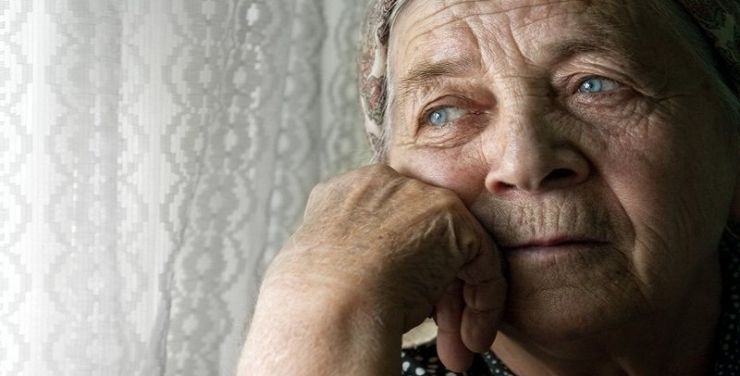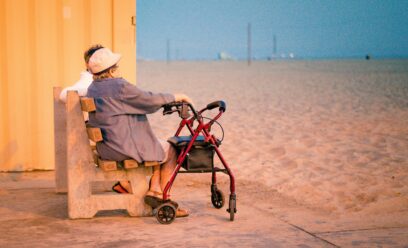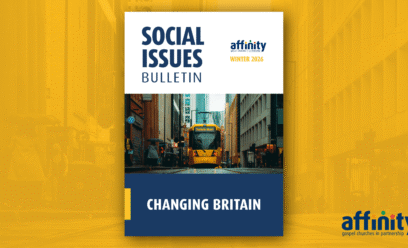The Spiritual Impact of Coronavirus on Older People

The latest issue of Affinity’s Social Issues Bulletin is out now. It is free to download, as are all previous editions. One of the articles, by Roger Hitchings, looks at some of the unseen but very real effects of the prolonged lockdown on older members of society.
It would not be an understatement to say that the last eight months have been turbulent and disconcerting for many people in our society. The mental health impacts of lockdown and the on-going restrictions have been well discussed. Older people have experienced extremely demanding circumstances particularly through loneliness and isolation. A number of practical but partial responses have been developed in society which in many cases have reduced the impact, if only to a small degree.
Many churches have sought to respond to the new situation in the best way they can and, alongside using technology to maintain preaching and teaching ministries, imaginative and practical ways of supporting people in their own homes have been developed. However, there is one aspect of the situation that has hardly been discussed, if it has been discussed at all – the damage the restrictions have brought to the spiritual health of those who are older.
Emotional and spiritual responses are always very personal and individual, and this must never be forgotten, so it is dangerous to draw conclusions that are applicable to everyone. At the heart of pastoral concern and support is the ability to distinguish between different reactions to events, and to both understand their causes and know the best way to bring comfort and care to each person.
There are, of course, a plethora of demands on church leaders at this time and the needs of older people are not always easily recognised, sometimes because they may not be that well understood. This article seeks to explore these matters so that pastors and others may respond more effectively.
Basic Facts about Older People
It is estimated that about one million older people in the UK live alone. There are also one million older people who have no children to look to for support (and a lot more do have children but do not receive adequate help from them). Four million older people have no access to the internet, and many who do are not especially competent in using it. Seventy percent of people over 60 have a hearing deficiency which makes the wearing of masks a problem for communication, and thus a significant isolating factor. (As a wearer of hearing aids myself, I find I tend to back off from conversations that involve several people or someone who is wearing a face covering). It is estimated that about half of older people are now showing signs of depression since lockdown began. Alongside other aspects of ageing these few facts illustrate the need for attention to be given to older people at this time.
A report by AgeUK[1] observes that, according to research, ‘as many as a third of older people really are struggling and, given the reluctance of this age group to admit their difficulties and ask for help, we suspect that in reality the numbers affected are considerably higher – running into millions, without doubt’ (emphasis mine). This point needs to be borne in mind when dealing with older people. It is part of their culture not to open up about their needs, so we should not excuse our lack of attention because ‘they never said anything’. Surely there is a duty on those who care for older people to explore and discover the truth; love, gentleness and spiritual perception can open many doors.
Loneliness
The chief impact of the pandemic has been in terms of reduced social contact and consequent loneliness. Having said that, we must remind ourselves that there is a major difference between loneliness and isolation; being alone does not necessarily equate with feeling lonely. Loneliness is essentially about disappointed expectation. That is why two people can have remarkably similar experiences of reduced social contact, and yet one feels much more lonely than the other. Each of us has an expectation of relationships and being with others that is built on several factors: our individual personality, our past experience, how we are affected by external forms of information, and physical necessity.
John is an able preacher and, although quite elderly, engages in an extensive and effective public ministry. He is a most gregarious man who thrives on being with others. He is also a godly man with a high reputation among the many people who know him. A couple of years ago his wife died, leaving him feeling bereft. Until the lockdown he was able to keep himself busy, and although his sense of loss was great, he maintained a positive and contented mindset. Then came enforced isolation, and he did not cope. The feelings of loneliness became overwhelming, and he was immersed in sadness and despair. He still kept up his personal spiritual life; anyone speaking with him would find him becoming more and more animated as the conversation went on. But his overall positivity and cheerfulness had declined. After such an extended period of being restricted in what he was able to do, he decided he would go to live in a care home, just to be with people more than he can be at present. The decision was not based on physical or mental problems; he continues to be extremely healthy and intellectually he is still very sharp. But emotionally and spiritually he is struggling. His need has not really been recognised by his church and so there has been no effort made to address his loneliness.
The recent report by AgeUK1 which polled 1,364 people made the assessment that ‘millions of pensioners have been crushed by lockdown, with many vulnerable people losing confidence, mobility and functions such as memory.’ It also said that ‘lockdown restrictions had left many vulnerable people isolated and anxious, without the support they needed’. In addition, it warned that Covid-19 has ‘hit the fast-forward button on ageing’, with a substantial group of people left ‘frightened, depressed and very much alone’. It is now well established that loneliness in older people carries a 45% increased risk of mortality and has a health impact similar to smoking 15 cigarettes a day.
Loneliness also has a seriously debilitating spiritual effect. One of the effects of the on-going pressure of the pandemic on men and women has apparently been the development of a form of apathy such that they stop trying to comply with regulations out of sheer weariness. There is a parallel to this in spiritual terms: The absence of social interaction, including spiritual conversation, the loss of attendance at corporate church activities and the reduction in encouragement from others to pursue godliness, can result in a form of spiritual lethargy. Furthermore, the absence of interaction with others leads to a diminished sense of personal value; there is often a feeling that ‘nobody cares’ and so ‘I don’t really matter’. For all of us a sense of personal identity is constantly bolstered by the affection and friendship of others. When that is reduced or removed over a sustained period of time, our own self-image is diminished which may, for some, have serious spiritual repercussions, for example the development of doubts: ‘If no-one cares for me, does God still care?’ In the loneliest times the enemy of our souls is not slow to repeat that with emphasis.
Loss of Usefulness and Purpose
Even in normal times older people may lose their feeling of usefulness by the way the church conducts its life. Being of value to others and doing things for others is particularly important to our self-worth. Being made in God’s image we have a desire to serve God and others, so to be unable to do so for an extended period, such as during lockdown, creates a void that diminishes our sense of purpose. Melancholy and feelings of inadequacy may grow.
This is often also reflected in the way older people become excessively self-deprecating and even reluctant to accept offers of help. There is a mixture of embarrassment over their feelings (‘mature believers should be stronger than this’) and also a genuine sense that there are others who deserve attention more. These feelings may not be easily expressed but they constitute a genuine spiritual need.
In the Lancet Healthy Longevity journal an article entitled ‘A life-course model for healthier ageing: lessons learned during the COVID-19 pandemic’[2] the authors say, ‘Older people are also vulnerable to indirect impacts of COVID-19, including food insecurity, social isolation and financial instability.’ These unexpected consequences of the virus lead to increased insecurity for older people ‘especially when public health recommendations insist on isolation from friends and loved ones’. The Daily Telegraph suggested that ‘elderly people could wear ribbons to indicate they are social distancing to help life get back to normal’.[3] But they may feel like lepers if they are treated differently, and that difference is advertised to warn others to keep clear. Whilst that is the very opposite of what is intended, it may suggest that older people are less capable of fulfilling their duty to social distance like everyone else.
This sense of diminished value is reinforced by the often-repeated comment that younger people are suffering greater loss under lockdown than older people. So it has been suggested that the triple lock on pensions should be removed to release funds to subsidise younger people, as though that is a privilege that they no longer merit, even though they have contributed in a multiplicity of ways for it. Most older people have great sympathy for the plight of younger people, but the linking of their supposed advantages with the difficulties of the younger generation may induce a sense of guilt. If nothing else, such comments add to the general air of depression; Silver Line, a telephone helpline for older people, reports an almost trebling of calls in recent months.
This depressed mood may lead to an undervaluing of the work of grace. Personal devotions lose their attraction, and if pursued because of habit they become cold. ‘I cannot remember when I last had a stimulating time of devotion’ was one brother’s complaint. Yet he still believed all he had ever believed and spoke about trusting the Lord. Such people need help; reassurance and understanding are vital, along with tender challenge which reminds them of the triumph of the grace of God and directs their attention to the Scripture from which new strength can be gained.
Mental Deterioration
All the above have a particular impact on those who have existing mental health problems. A survey by the Alzheimer’s Society[4] of around 2,000 people affected by dementia revealed that lack of social contact, change to normal routine and reports of the death of friends combine to produce serious deterioration in mental health. Forty-five percent of respondents said that lockdown had had a negative impact on their mental health and 46% of unpaid carers (usually a spouse or family member) reported a loved one with dementia to have experienced stress, anxiety and depression. About a third of respondents spoke of ‘giving up’ or ‘losing hope’. This may account for the high incidence of death among those with dementia[5]. The plight of carers in this is a further serious matter but cannot be explored in this article.
The report of by AgeUK referred to above found that around a quarter of those contacted said they could not walk as far as they used to, one third were conscious of becoming more anxious, and one fifth have suffered a deterioration in their memory. Two thirds felt less confident taking public transport, while two in five were worried about going to the shops and a quarter were even unsure about spending time with their family.
Many in our churches suffer from dementia. Of those whom I know personally, all but one would say that they have seen significant deterioration during this pandemic, and yet support from their churches has been largely disappointing. (That is understandable given the range of demands on churches at this very difficult time.)
The Fear of Covid
The AgeUK report also stated that ‘fear of the virus, loss of mental and physical capacity, loneliness and isolation and an inability to grieve as normal for those they have lost add up to a potential public health emergency affecting many older people.’1 The possibility of contracting Covid is utterly terrifying for many; it is a thought that lingers in the mind nearly all the time. Even the things that bring most joy – visits from family and especially grandchildren – are now tainted with fear. Life seems to have little positive about it and seems to be a choice between loneliness and danger. This sense of negativity is only reinforced by the media who seem to delight to report how bad things are – or at least that is how so many older people read the situation. Of course, such a gloomy picture is not representative of all older people, but even among a group of lively over 70s who meet every week on Zoom for Bible study, these thoughts come out at times. It is clear that the temptation to negativity is a reality in the experience of a significant number of older believers.
These observations are drawn from the writer’s own experience and conversations with those working with older people around the country. Forty-three percent of those who are shielding are over 70 and therefore are most conscious of the threat the disease poses to them. This legitimate fear is difficult to handle even for the godliest. This, along with isolation and feeling devalued, calls for personal pastoral attention. Many feel discouraged that, as believers, they seem unable to rise above these things. Some pastors have wisely and carefully addressed the fear of death, but I am told by others that their pastor has not dealt with it at all. Death is still an enemy and its power is diminished when people are informed about the biblical teaching.
It is not unusual for older believers to experience a loss of assurance. The losses that come with ageing and the deaths of friends, physical and intellectual decline, and the diminishment of the sphere of influence and usefulness, all combine under normal circumstances to challenge our confidence in God, as they also challenge our confidence in others and ourselves. The impact of Covid adds to the pressures that assail our spiritual well-being; it is a very real problem which is rarely spoken about. In fact, many older people seem to accept that as they age they will lose confidence in many things and that the loss of assurance is one of those things.
Anxiety
There is a phenomenon that is being called ‘Covid anxiety’. Articles have been written identifying it and some of its features, and giving advice on how to cope. With job insecurity, financial pressures and family concerns, it is no surprise to see a rise in anxiety across society. Older people are not immune to this and they have their own areas of concern to deal with.
The Office for National Statistics undertook a survey of 6,400 adults of all age groups between 3 April and 10 May to explore their concerns during the pandemic and what their coping strategies were. In particular older people said they were ‘worried about the impact of the virus on access to groceries, medications, and other essentials.’[6] It is probably fair to say that most aspects of lockdown are worse for older people; operations on cataracts, knees and hip joints have all been postponed and affect older people primarily. Dentists are closed, while GPs are only available on the phone (provided you can hear). The general advice for older people is to keep active and get outdoors because this is vital for both mind and body. But what happens if you fall? The thought of admission to hospital is unwelcome and going into a care home following an accident is also not pleasant prospect.
One area of concern that generates particular anxiety is the inability to grieve. A common experience of ageing is the death of friends and peers. In normal times it is possible to sit with loved ones and talk about the loss, and grieve together. Now, numbers attending a funeral are limited; age and shielding may exclude some from participation; providing comfort or sharing a precious memory becomes difficult – the telephone seems so impersonal and Zoom and Skype have their complexities for older people and still do not give that feeling of proximity. All of this generates a world of emotions that burn deep in the soul.
The net effect of these various forms of anxiety can often be the loss of joy and contentment. In Christ we have real and deep-seated joy, and as we get older and learn the ways of God we grow in contentment. But this can be disturbed by anxieties. As Cowper wrote, ‘Where is the blessedness I knew when first I saw the Lord?’
Possible Responses
Fundamental to any response is firstly to understand the issues involved. This article has attempted to set those out – spiritual lethargy, doubts, lost personal value, fear of death, loss of assurance, and loss of joy and contentment. The causes are many and we have considered a few. So what might appropriate responses be?
· Remember the importance of regular and frequent contact – pastors might set aside one afternoon a week to contact those who are struggling spiritually because of Covid. But first such folk have to be identified. So, either by personal visits and telephone calls, or by a structured monitoring system of the older people in the church utilising others in the fellowship, older people should enjoy regular and frequent contact. Where specific problems are identified then the pastor or a leader with skill and experience may make a more personal contact. Some elements of training of people involved may be useful.
· Remember those who have no internet access – many churches send CDs of the ministry to people who are unable to access the church services on video or Zoom. But that can be impersonal and for those who find concentration difficult, and that is a major issue for older people, a more personal approach would be useful. One dear old lady I know rings every person who does not have access to the internet in her church and gives a summary of the preaching and then prays with each person. It takes her a couple of hours each day through the week but those she rings treasure her care and support. That is one imaginative way of meeting this need.
· Remember the ‘Can’t Comes’ – as more and more churches return to holding at least one service in their building it will become clear that not everyone who wants to attend will be able to do so. People who are shielding, clinically vulnerable and ,for some, age will be among the factors that mean they cannot come. A large percentage of these ‘can’t comes’ will be older people. In a helpful article published by the FIEC[7], Johnny Prime suggests that an element should be included in the service that shows that this group are included. It might be a mention of them in a prayer, or a hymn or song that would be well-known to them. It is also possible to ring people during the week after the service and talk with the older person about what they received from the Lord through the ministry. Follow up on the service with these ‘can’t comes’ is a very important way of emphasising that they are still valued.
· Remember the need for one-to-one spiritual stimulation – it is vital to remind those who cannot get out that they are not forgotten by the church or, more importantly, by the Lord himself. That can be done by a whole plethora of means. The way chosen is not as important as the actual doing of it.
· Remember the possibility in some areas of small groups gathering – depending on the area and the particular tier it is in, small group gatherings of two or three can be organised. The fear of breaking the rules often leads to older people to doing nothing. So, guidance and organisation that puts arrangements in place is often a useful way of getting things started.
· Remember the special needs of those with dementia – thoughtful and relevant means must be found to encourage and minister spiritually to those so suffering and any carer who may be involved with them. Simple conversations with them that talk through what would be best are easy to arrange. Then that should be followed up with implementation. It may seem challenging, but it is essential because they are the Lord’s people, and the church has a duty to provide for them.
May the Lord give us grace and wisdom to respond to the need of our older brothers and sisters, to give a cup of water in the Lord’s name and so serve him in a special way.
Roger Hitchings
Roger Hitchings retired in 2011 from the pastorate of a small church in the East Midlands after 15 years of ministry. Previously he worked for 23 years in the field of social welfare with a particular emphasis on older people, and continues with that area of interest through writing and speaking.
(This article was originally published in the Affinity Social Issues Bulletin for November 2020. The whole edition can be found at www.affinity.org.uk)
[1] https://www.telegraph.co.uk/news/2020/10/16/lockdown-has-crushed-millions-pensioners-charity-warns
[2] https://www.thelancet.com/journals/lanhl/article/PIIS2666-7568(20)30008-8/fulltext
[3] The Daily Telegraph, Monday 22 June 2020.
[4] ‘Lockdown’s side effect: mental health deterioration of people affected by dementia, with third giving up’ The Spectator, 4 July 2020.
[5] https://www.bbc.co.uk/news/uk-wales-53739223
[6] https://blog.ons.gov.uk/2020/06/22/how-has-lockdown-affected-people-of-different-ages
[7] https://fiec.org.uk/resources/remembering-the-cant-comes
Stay connected with our monthly update
Sign up to receive the latest news from Affinity and our members, delivered straight to your inbox once a month.



